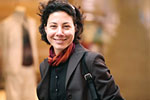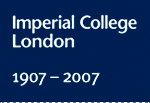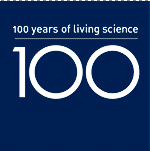Opening up to Science
Sir Richard Sykes presents a special Centenary Lecture at Londonís Guildhall
18 September 2007
By Sophie Corcoran
The paradoxes presented by the modern world’s attitude to science, decreasing numbers of young people in the Western world progressing into scientific careers, and the importance of science in our everyday lives were just some of the issues explored by the Rector, Sir Richard Sykes in a lecture at London’s Guildhall, which marked the Centenary of the founding of Imperial College London. Around 250 guests including city-based alumni of the College, senior academics and some of the College’s former Rectors attended the event on Tuesday 18 September.
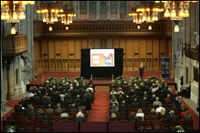 Upon arrival at the Guildhall, guests were directed to the Great Hall. The lecture, entitled ‘Opening up to Science’, began by documenting the history of Imperial and its founding links to the City and the Livery Companies and went on to discuss what science at Imperial has already bought us and the prolific accomplishments of leading Imperial scientists.
Upon arrival at the Guildhall, guests were directed to the Great Hall. The lecture, entitled ‘Opening up to Science’, began by documenting the history of Imperial and its founding links to the City and the Livery Companies and went on to discuss what science at Imperial has already bought us and the prolific accomplishments of leading Imperial scientists.
Photo left: The Great Hall
“Without the products of science, we would be much poorer in many ways,” said Sir Richard. “Clean water, food crops, medicines, manufacturing infrastructure and transport are just some of the essentials of life which depend on modern scientific knowledge and its application.”
Sir Richard highlighted the fact that science is behind many of the things we take for granted in our everyday lives, presenting mobile phones, personal computers and even running shoes as products of a growing scientific knowledge. “Science also has huge impacts on our leisure time,” continued Sir Richard. “It is fascinating in this context to consider one of the most important aspirations of humankind, the ability to hit a golf ball long and straight.”
The Rector then looked at the issues currently being addressed by scientists, focusing on the study of the universe, particle physics and the modern aero-engine before discussing advancements in medicine and predicting an increased importance of genetics and molecules in understanding the human body in coming years.
How we live in and with our environment and the acceptance that at least some of the climate change we are currently experiencing is man-made was then examined. Sir Richard commented: “The environmental and economic consequences of not intervening are potentially catastrophic. All hopes of averting catastrophic changes depend on scientific approaches to understanding the causes of the changes we see.”
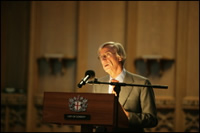 Concluding the lecture, Sir Richard Sykes questioned why young people are no longer sufficiently engaged with science. “The reasons behind this disenchantment with science are undoubtedly multi-factorial,” he commented. “We will not breed tomorrow’s engineers and scientists unless we persuade young people of the importance of the rigorous approach to maths and science which underlies the true generation of new knowledge.
Concluding the lecture, Sir Richard Sykes questioned why young people are no longer sufficiently engaged with science. “The reasons behind this disenchantment with science are undoubtedly multi-factorial,” he commented. “We will not breed tomorrow’s engineers and scientists unless we persuade young people of the importance of the rigorous approach to maths and science which underlies the true generation of new knowledge.
Photo above: Sir Richard Sykes
The lecture was followed by a drinks reception kindly hosted by the Corporation of London in honour of the City’s historic connections with the College.
© 2007 Imperial College London

Science and technology have the power to transform the world. Today’s complex challenges demand new approaches, fresh thinking and scientific innovation. Donate now to support research and education at Imperial.
Where your support can make a differenceGive now
